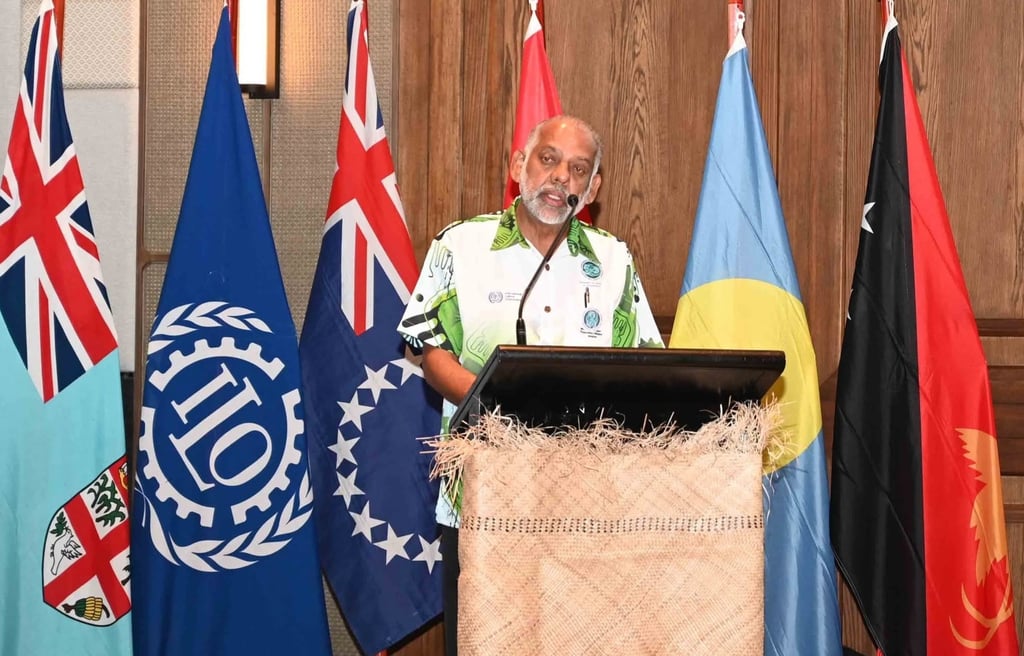Singh: Decent Work is the Foundation of Fiji’s Vision for a Prosperous Pacific
FIJI NEWS


Nadi, Fiji — Fiji’s Minister for Employment, Productivity and Workplace Relations, Hon. Agni Deo Singh, has reaffirmed that “Decent Work and Sustainable Employment for All” remains the cornerstone of Fiji’s development agenda, calling it the key to both social justice and economic security.
“Decent work provides citizens with stable, well-paid jobs that improve their living standards and economic security, fostering an economically stable society,” Singh said in his opening remarks at the Pacific Regional Tripartite Employment Conference in Nadi
He emphasized that Fiji’s Constitution guarantees workers the right to fair employment practices, just wages, equal opportunities, and union participation, while protecting against forced labour, child labour, and discrimination.
“Dignity and justice remain at the heart of our labour framework,” he added
The Minister described the four-day conference as “historic,” noting that it not only provides a platform to confront pressing employment challenges but also commemorates fifty years of ILO partnership in the Pacific.
“Since its establishment in the region, the ILO has worked tirelessly with governments, workers, and employers to advance the principles of decent work, social justice, and inclusive economic growth,” Singh said
He credited the ILO with helping build strong labour institutions, supporting labour mobility frameworks, advancing social protection measures, and empowering Pacific Islanders to fully participate in economic development.
With the conference theme “Designing for Disruption: Decent Work, Climate Change, and Security”, Singh warned that the Pacific stands at the frontline of multiple global challenges.
“These challenges, though complex, present opportunities for innovation. They require us to rethink traditional approaches and design strategies that ensure sustainable and inclusive development, strengthen resilience, and protect the rights and dignity of every worker,” he said
He also linked the agenda directly to the UN Sustainable Development Goals, highlighting SDG 8 on decent work and economic growth, SDG 13 on climate action, and SDG 16 on peace, justice and strong institutions as central to Fiji’s policies.
The Minister underscored that regional cooperation and solidarity are essential if Pacific nations are to navigate these disruptions together.
“This conference has several critical objectives,” he explained. “It seeks to foster regional collaboration and strengthen tripartite dialogue among governments, employers, and workers… and it intends to build climate and economic resilience, ensuring that Pacific communities can adapt to and thrive amid the disruptions that affect both employment and livelihoods”
Singh reminded delegates of the Pacific’s shared traditions of working together, drawing on Fijian cultural concepts: “The significance of this conference is further strengthened by its tripartite nature. This reminds us of the Fijian concept of Solesolevaki… and also the vuvale concept as practised in our Pacific setting”
He urged participants to engage actively over the four days: “Over the next four days, I encourage all delegates to engage actively, share your experiences, and build partnerships that will ensure our region continues to advance in line with international labour standards”
Concluding his remarks, the Minister expressed confidence that the outcomes of the conference would guide Pacific nations toward resilience, fairness, and prosperity.
“The achievements of the past 50 years demonstrate the value of sustained cooperation and commitment, and I am confident that the outcomes of this conference will guide our work toward a more resilient, fair, and prosperous Pacific”